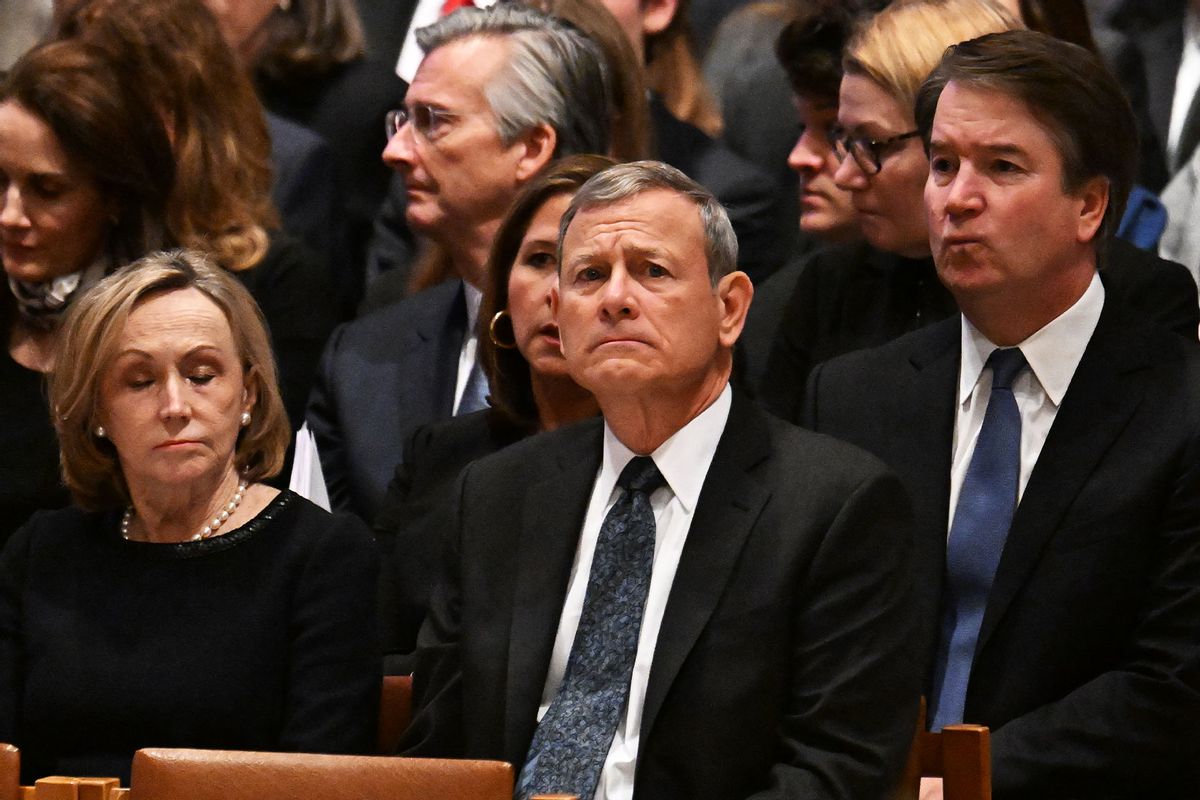John Roberts, the chief justice of the Supreme Court, on Feb. 22 issued a memo to his colleagues urging them not only to take up an appeal from former President Donald Trump over his immunity claim, but also to rule in favor of granting him that immunity.
“I think it likely that we will view the separation of powers analysis differently” from the appeals court, he wrote in the memo leaked to the New York Times, essentially suggesting the court would shield Trump from certain charges and the appellate court's decision greenlighting his 2020 election interference trial.
The document, along with other justices' memos, accounts of the proceedings and testimony from sources the Times interviewed, offers a window into Roberts' high level of involvement in several cases that benefited Trump and ultimately helped him climb out of a mire of legal troubles that threatened to upend his 2024 presidential campaign. According to the Times, his handling of the cases surprised other justices in a court where six of the nine members have been appointed by Republican presidents. Three of them were appointed by Trump.
Roberts exerted his influence in March this year, when he persuaded the other judges to rule that states could not unilaterally kick federal candidates from a ballot. While the judges agreed unanimously on the matter, the court's liberals dissented to an additional proposition that anyone seeking to enforce the Constitution's Fourteenth Amendment against insurrectionist candidates running for office would need to first obtain congressional approval. In June, the chief justice took charge of the case that ended with the court declaring that the government was too zealous in its prosecution of January 6 insurrectionists. The case was originally assigned to Justice Samuel Alito, who surrendered it to Roberts shortly after the storm broke over his wife hanging an upside-down American flag -- an emblem of the "Stop the Steal" movement -- though it's unconfirmed that the flag controversy was the reason for the switch.
Alito's flag troubles and revelations that Justice Clarence Thomas's wife Virginia encouraged some of Trump's efforts to overturn the 2020 election provoked widespread calls for the two judges to recuse themselves from the three cases involving Trump. Both of them, declining those calls, ruled with the conservative majority in all of them.
The Times reported that during the discussions over Trump's immunity case, some of the conservative justices wanted to schedule it for the next term, which would have certainly meant a post-election decision. The chief justice, joining the court's liberals, chose to hear the case earlier. Oral arguments began in April, and, by then, it was clear that Roberts and the other conservative justices were focusing not on Trump's actions or the "here and now of this case," in the words of Justice Brett Kavanaugh, but on broader legal questions.
“I’m not discussing the particular facts of this case,” Alito told the courtroom. Justice Neil Gorsuch added that they were writing "a rule for the ages."
Roberts and Kavanaugh, who worked to protect presidential powers as White House lawyers, brought their perspective to the bench, raising concerns that a president who could be prosecuted for official acts might not wield his powers effectively.
We need your help to stay independent
Two months later, Roberts circulated a draft opinion that prompted Justice Sonia Sotomayor to offer agreement on some points in order to moderate the forthcoming decision, according to sources familiar with the proceedings. Roberts, who has often favored consensus, did not accept. In a historic 6-3 decision, the Supreme Court made a ruling that not only shielded Trump from prosecution, but also broadly expanded the scope of presidential power in the future.
Roberts used a decidedly lofty tone to justify the decision, invoking Alexander Hamilton's views on a strong presidency to argue that the desire to hold Trump accountable could not justify a clipping of his office's authority. “In a case like this one, focusing on ‘transient results’ may have profound consequences for the separation of powers and for the future of our Republic,” he wrote. “Our perspective must be more farsighted.”
That perspective, if it ever had merit, did not resonate with the public. Liberals condemned the decision as a dangerous abuse of power by conservative justices, while conservatives celebrated it as a political victory for their favored presidential candidate. And it failed to provide cover for a Supreme Court already diminished by other much-criticized decisions and scandals that raised questions over the partiality of some of its justices.
Overseeing the immunity case before the Supreme Court's intervention was Judge Tanya Chutkan, who must now interpret the its ruling in Trump v. United States and decide which charges against Trump are still valid under the new framing of what a president can or cannot do. And when that interpretation is revealed, both sides will be able to appeal her ruling. More delays are likely, as is the seeming inevitability that the case will once again end up in the Supreme Court.



Shares